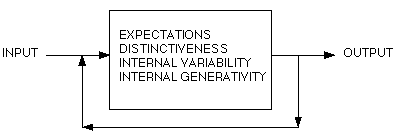Neurobiology and Behavior 2001
 
| Welcome to the home page of Biology 202 at Bryn Mawr College. Pleased to have you here. I'm looking forward to an interesting, enjoyable, productive semester of "getting it progressively less wrong". You too, I hope. Let's have some fun, and see what we can make out of it together. For everyone.
|
|
|

|
Some course starting points:
From literature - Emily Dickinson (1830-1886)
:
The Brain - is wider than the Sky -
For - put them side by side -
The one the other will contain
With ease - and You - beside-
The Brain is deeper than the sea -
For - hold them - Blue to Bue -
The one the other will absorb -
As sponges - Buckets - do
The Brain is just the weight of God -
For - Heft them - Pound for Pound -
And they will differ - if they do -
As syllable from Sound -
|
Tell all the Truth but tell it slant-
Success in Circuit lies
Too bright for our infirm Delight
The Truth's superb surprise
As Lightening to the Children eased
With explanation kind
The Truth must dazzle gradually
Or ever man be blind -
|
And from history:
Course announcements
Browse around. Get a sense of what's here, and how it does (or doesn't) relate to things you might be interested in. Think about what you think you know about brain and behavior, and why, and what puzzles you, and why. And expect to be wrong, over and over again. That's the best starting place ... for any kind of scientific inquiry.
Please fill out "getting it less wrong" form at beginning of class today
Please make one last visit to course forum area this weekend:
Revisit your thoughts about brain=behavior at beginning of course. What has changed/not changed in your thinking, and why?
Final web paper (hard copy in box outside Room 106, e-version) due at end of exam period:
Seniors - Saturday, 12 May, 5 pm
All others - Friday, 18 May, 5 pm
Religion and the Brain - Time magazine, 7 May 2001 (thanks to Elizabeth Gilbert)
Mental Health Conversations
Thursday, 3 May, 6 pm, Thomas 102
Pizza provided, contact Daniel Burdick or Elizabeth Gilbert
Forum Archive
- Week 1
If you agree that "brain=behavior", why? what would persuade you otherwise? If you disagree with "brain=behavior", or are fence-sitting on the question, why? What aspects of behavior/human experience do you think would be difficult or impossible to account for in terms of the brain? And why?
- Week 2
Thinking about the behavior of quadraplegics suggests that Dickinson (and several of your suggestions) may indeed be right: that the self is not only contained within the nervous system but is in fact "smaller" than the nervous system. The relevant points are that input to the nervous system and outputs from it can occur without the person experiencing either. What do you think of this set of observations and the interpretations placed on it? of the notion of an "I-function" as a box within the nervous system? What implications/questions follow from it?
- Week 3
It was suggested at the beginning of the course that studies of the nervous system weren't in fact a way to "explain" behavior but instead a way to look at behavior from a different perspective which would yield new and different understandings of what behavior is. The study of the properties of neurons would seem to be a long ways from behavior. Do you think that studying the properties of neurons could itself change your understanding of (and questions about) behavior? If not, why not? If so, in what ways has this already happened? In what ways can you imagine it might happen?
- Week 4
Neurons turns out to be input/output boxes which integrate (non-linearly) current flows resulting from permeabilities and permeability changes. As such, they are both remarkably simple and remarkably sophisticated. Does understanding the properties of neurons in fact change how one thinks about behavior? Are the smallest boxes "simple" enough so that one might entertain the idea of being able to make sense of behavior without mysticism? Are they sophisticated enough so that one can imagine how even the most sophisticated aspects of behavior might in principle be imagined to result from interconnected assemblies of these boxes?
- Weeks 5-6
How useful are concepts like "central pattern generation", "corollary discharge", "proprioception and reafference", "genetic and environmental influences" in making sense of "action"? in what ways might one use these ideas as well to better understand other aspects of nervous system organization/behavior?
- Weeks 7-8
What implications follow from observations made in relation to the blindspot? With regard to vision, to "perception" in general, to the "I-function"?
- Weeks 9-10
Lateral inhibition, the brightness/color distinction, and color processing itself all lead to some important conclusions about "perception" (the "picture in your head") and about how it is achieved by the nervous system. Among them is a possible answer to the old question "if a tree falls in a forest and no one is around, does it make a sound?". The answer, it was suggested in class, is "no". What do you think of the logic (observations and interpretations) used to reach this answer? about its implications?
- Week 11
Withe three weeks to go, what are the KEY things still to talk about to get as much as possible less wrong? Do we need to imagine totally new kinds of neurons? of boxes? or interconnections? If brain and behavior are the same thing? Or have we got most of the groundwork we need? What behaviors/human experiences are STILL a problem to make sense of? Have a look at some of the second group of web papers, reflect a bit on where we are, and suggest an agenda for the last three weeks?
- Week 12
We were SUPPOSED to cover creativity, emotions and personality, learning and memory, and the I-function. Well, frogs turn out to have something to do with creativity, and sleep/wake with emotions ... and maybe personality? And both have tell us a little more about the I-function? What do you think? Are we on course, or have we left out important things about creativity, emotions/personality?
- Week 13
What's STILL missing if we take the brain=behavior idea seriously? We going to make it ... all the way ... to Emily?
- Week 14
Well ... ? Where were you on Emily's suggestion at the beginning of the course? And where are you now? Is the brain big enough to contain everything, or not? The internal mechanisms well enough know to begin to answer the question, or no? Has your perspective changed or not? And in either case, why?. What observations are particularly compelling to you one way or another? Have you new questions, new ways to explore them? Or the same old questions, with the same certainties/uncertainties?
|
Course Home Page
|
Forum |
Brain and
Behavior |
Serendip Home |
Send us your comments at Serendip
 © by Serendip 1994-
- Last Modified:
Wednesday, 02-May-2018 10:52:53 CDT
© by Serendip 1994-
- Last Modified:
Wednesday, 02-May-2018 10:52:53 CDT

